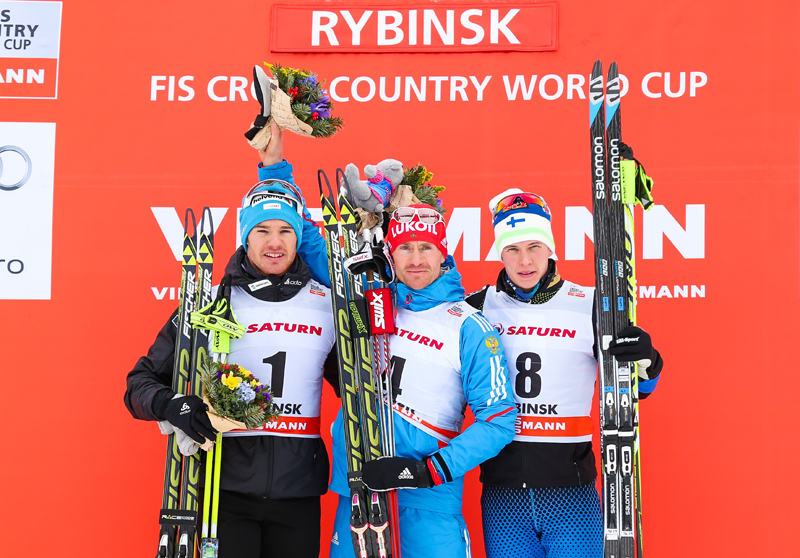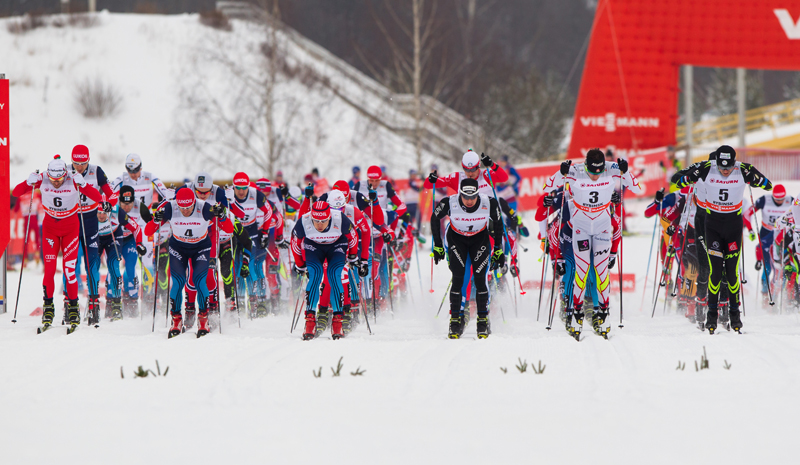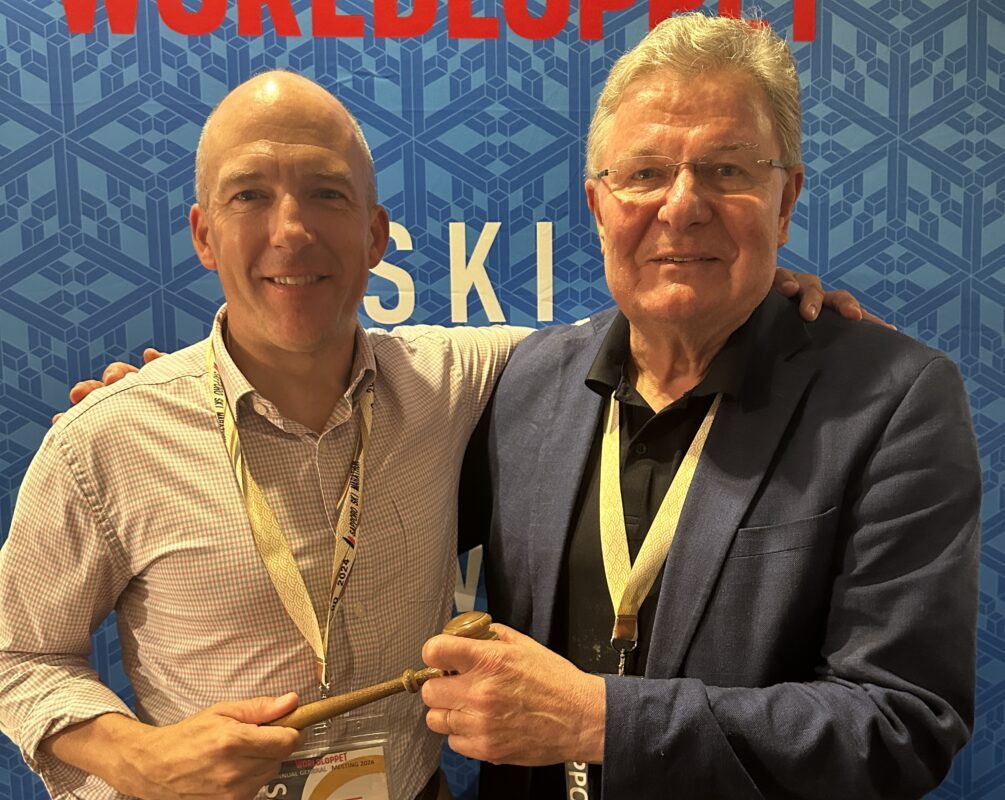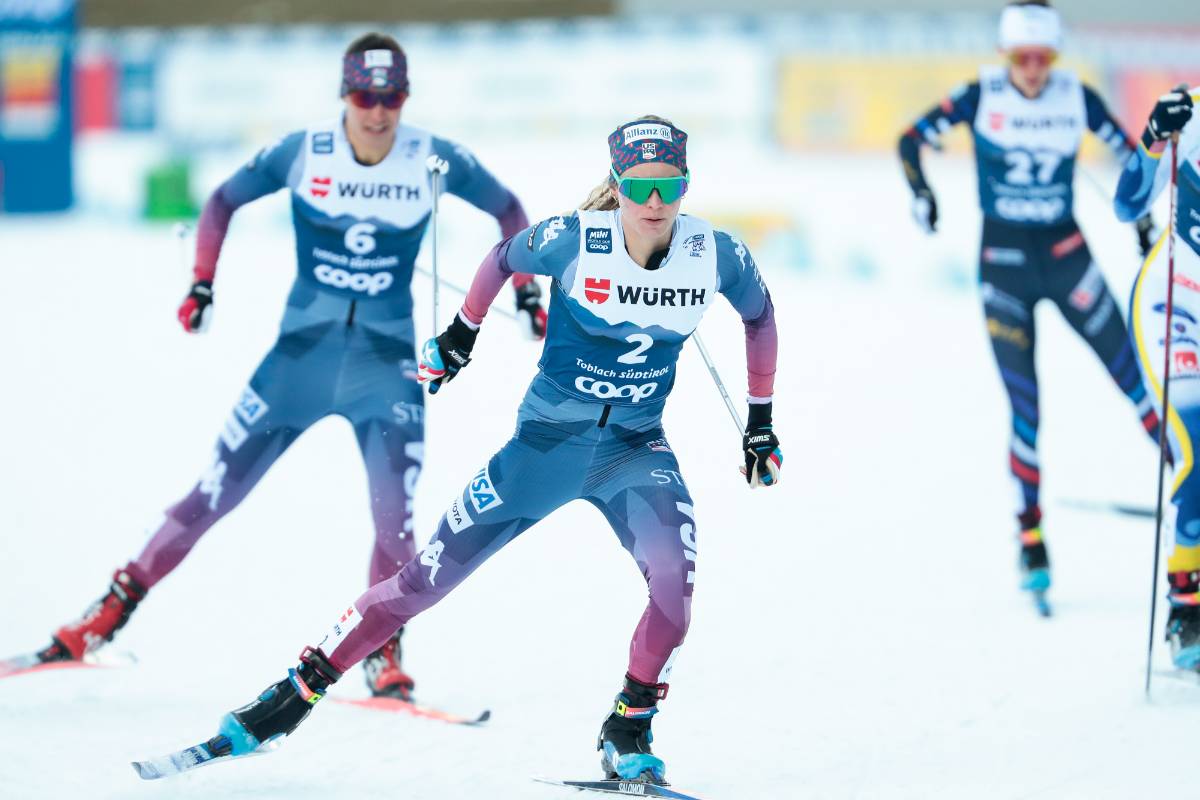
Although it isn’t an event that is common on the World Cup race circuit, the skiathlon one race Switzerland’s Dario Cologna has excelled in over the years.
The last World Cup skiathlon was held at the 2013 pre-World Cup in Sochi, Russia, and used as a leadup to the upcoming Olympics. Before Sunday, Cologna had won the last four international skiathlon events he participated in, including the skiathlon at the 2014 Sochi Games, making him the favorite to win the men’s World Cup 30-kilometer skiathlon in Rybinsk, Russia.
The 28 year old had also won more races in Russia than he had in any other country: two World Cups (including Saturday’s 15 k skate) and two 2014 Olympic events (the skiathlon and 15 k classic).
The only problems were that this was a new year and he was up against a strong Russian team (among others) motivated to win on Russian soil. That was about all Russian national-team member Maxim Vylegzhanin needed in terms of headspace to outpace Cologna by 2.7 seconds on Sunday.
The two athletes would became very familiar with the Rybinsk course by the end of the 12-lap race. After six 2.5-k loops of classic, they went head to head for another six loops of skating on a different 2.5 k course. Both courses included several climbs that could separate the pack or prove to be the perfect place for an attack. It was a relatively warm day with falling snow so nailing the wax for the classic portion was tricky.
Early on, the race outcome appeared to be more in the hands of the wax techs than the skiers. Many athletes crashed and slipped during the first 15 k classic leg. The pace was extremely fast, which led several missteps. Cologna had an early scare in the first part of the race when he and Canadian Alex Harvey collided and both men fell. Cologna recovered, but Harvey ended up crashing three times in the classic portion. Several other skiers slipped up in the warm conditions as well.
For the most part, the pack stayed together for the majority of the first half of the race. The lead rotated several times between Cologna, Vylegzhanin and several others, with every attempted attack countered and nobody distancing themselves from the front group. At one point, Vylegzhanin’s teammate Alexander Bessmertnykh and France’s Jean-Marc Gaillard attempted a half-hearted attacked that strung out the field, but their lead was quickly absorbed once the rest of the pack hit the downhill.

Heading into the transition, a trio of Russians led the group into the corral. Stanislav Volzhentsev, Dmitriy Japarov and Evgeniy Belov arrived first in 43:14.5, followed closely by the rest of the group. The first one out onto the skate course was Russian Sergey Turyshev, who quickly set the lead pace while Japarov headed out 0.6 seconds behind, just ahead of some 20 others, including Harvey in 13th.
Once the skate skis were on, the Russian skis appeared to be the fastest of the field. At one point, Russia’s Alexey Vitsenko launched an attack on the downhill and opened a sizable gap, skiing away from the chase pack. Which Russian would ultimately win or podium was unclear, but it was evident their skis were going to help them get there.
Cologna noticed the difference.
“The start of the race was very quick but in the skate it was not so fast; I realized that my skis were maybe not as fast as the Russians’,” he told FIS afterward. “So I knew that I needed to attack before the finish to make the group smaller.”
Cologna’s attack came at the 25.9 k mark when he raced up the hill crossing the timing mat at 1:12:19. Vitsenko marked him closely and joined Cologna as he headed down the hill. Leading the chase group was Finland’s Matti Heikkinen, Gaillard and Vylegzhanin, who were flanked by Russians Alexander Leskov and Eugeniy Dementiev.
The Russian teamwork ended up keeping Cologna in check and Vylegzhanin close to the front. Heikkinen skied a strong skate leg and found himself in prime position toward the closing segments of the race.
Realizing his time to shake the pack was slipping away, Cologna gave one last push on the final climb. Vylegzhanin and Heikkinen anticipated his move and quickly latched on. This attack separated the three from the rest of the field and set up the battle for the podium spots.
“I pushed very hard at the end, but Maxim and Dario were too strong for me,” Heikkinen told FIS.
The change of pace left Heikkinen hanging behind the two leaders.
As Vylegzhanin and Cologna approached the finish line, the switchback design of the finish gave Vylegzhanin time to overtake Cologna and cross it first in 1:21:54.8 for his first victory in a year since winning the 15 k classic mass start in Szklarska Poreba, Poland.
“This is my first podium and win this season and it’s nice that it came in Russia,” Vylegzhanin told FIS. “The spectators are so great here. I had very good skis today and I am happy to the strongest at the finish. Thank you to the spectators, the organizers and of course my team for the great skis today. Russian skis like Russian snow!”
Cologna finished 2.7 seconds back in second, and Heikkinen rounded out the podium in third, 6.2 seconds after Vylegzhanin.
Although some the stronger skiers opted out of the Rybinsk World Cup weekend to prepare for the upcoming World Championships in Falun, Sweden, Heikkinen was pleased with his result.
“Sure, some of the best weren’t here, but a race is a race and I focus on Falun so this is a was a great step,” he said.
Russia put six in the top eight (sweeping fourth through eighth), with Volzhentsev in fourth, Chernousov in fifth, Konstantin Glavatskikh in sixth, Legkov in seventh, and Turyshev in eighth. Harvey placed ninth.
As a result of his second-place finish, Cologna moved up into second place in Overall World Cup standings, 333 points behind Norwegian leader Martin Johnsrud Sundby, who did not race in Rybinsk.
“I was hoping for another win here today … but I am happy with second place,” Cologna said. “It was a good weekend for me and I can see where my shape is.”
Sunday marked the last World Cup race before a two-week break as athletes prepare for the World Championships, which start on Feb. 18. A World Cup will be held in Östersund, Sweden, the weekend before, Feb. 14-15.



